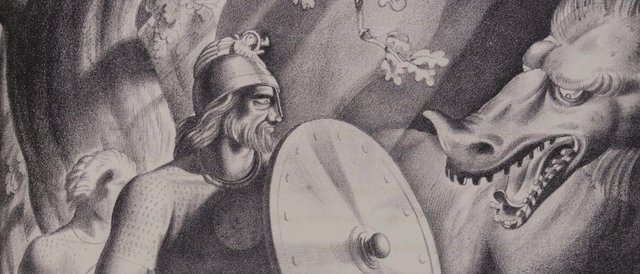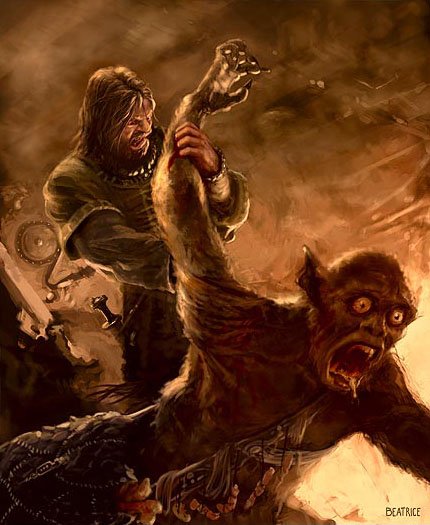Nowadays, society is increasingly interested in Western European culture and literature. One aspect of this interest is the northern European heroic epos. After the collapse of the Roman Empire, the center of cultural life moved from the Mediterranean to the north to Scandinavia , Germany and England. This led to the development of literature, which had a style completely different from the Hellenistic. The basis for this literature were the beliefs and myths of the Indo-European peoples who came to Europe as a result of the Great Migration. These myths are intertwined with the legends of the indigenous population and formed a distinctive colour that has come down to us in the form of sagas, poems and songs.
One of the outstanding monuments of Anglo-Saxon writing is the poem "Beowulf" - a typical example of a heroic epic.
( )
)
Beowulf is the personification of the ideal hero. This poem highlights heroism of the main character in two separate periods of life - young and mature and through three separate and complex conflicts: with Grendel, his mother, and the dragon.
These three encounters can be seen as an expression of the heroic code, but they are rather the embodiment of ardent youthful heroism and the mature victory of the king.
In his youth, Beowulf - a great warrior, famous mainly for his feats of strength and courage. It also perfectly combines the customs and values imposed by the Germanic Scandinavian heroic code, including loyalty, valour, and pride. His victory over Grendel and his mother reaffirms the hero's reputation.
Hrothgar, who becomes a mentor and father to the young warrior, advises on ruling wisely. Although Beowulf was not a king for many years, his growth is an example of gradual maturation and maturation.
The theme of growing up the protagonist is widely popular for study in many schools and universities. Students are often invited to discuss the poem in groups and express their thoughts in an essays about Beowulf and a variety of research papers.
The second part of the poem located in the land of the Gauts, tells of the end of Beowulf's life. However, we can observe how Beowulf became a king through a sequence of retrospectives. For Beowulf, the time after Higelak's death marks a watershed moment. Instead of taking the throne for himself, he backs the legitimate successor to the throne, proving his loyalty once more. He demonstrates himself worthy of the title with this act of loyalty and respect for the kingdom.
In the final episode - meetings with the dragon:
For friend and for foeman. The folk now expecteth
A season of strife when the death of the folk-king
To Frankmen and Frisians in far-lands is published.
The poet considers the difference between a king who has to take care of his people and a warrior who has to take care of his own valour. So Beowulf's death is ambiguous, as the protagonist does not leave an heir, and thus puts his tribe in danger. However, from the point of view of a warrior, he does the right thing by choosing a glorious death. Beowulf's main feature is the internal conflict between the duty of the king and the honour of the warrior. The next masculine type is the image of Grendel, one of the three monsters defeated by Beowulf. Its nature is ambiguous. Although he has many animal traits (“horrible stranger”, “dwelt in the moor-fens”, “the kindred of Cain”).

Beowulf has a horrible appearance but still seems to be guided by human emotions and shows more inner experiences than one might expect. Such an image in literary criticism is called grotesque. Exiled to the swamps outside of human society, Grendel is an outcast. The poet hints that Grendel's aggression against the Danes was caused by loneliness and jealousy. According to the plotline, Grendel is a “Cain breed", which was outlawed by God. Thus, he is the character who embodies feelings of resentment and anger.

Conclusion
Beowulf differs very significantly from ordinary heroic poems in both volume and complexity. In the English tradition, heroic ballads rarely contained more than five hundred lines and described a single event (such as a battle) or a series of closely related events. Beowulf's plot required two contrasting series of events, and the poet described both series in great detail, paying great attention to the cultural environment (for example, court life in Denmark). Often he leaves aside both the hero and the monsters, referring to episodes, information or allusions concerning other characters in traditional narratives. Such retreats were supposed to somehow reconcile the battles with monsters with the world of Northern Europe in the 6th century. The poem says that the outstanding power of Beowulf, equal to the power of thirty ordinary people, was given to him by God. From a remarkable passage (lines 2177-2189), it is clear that the hero would not use this gift in an unworthy way but kept it for high achievements.